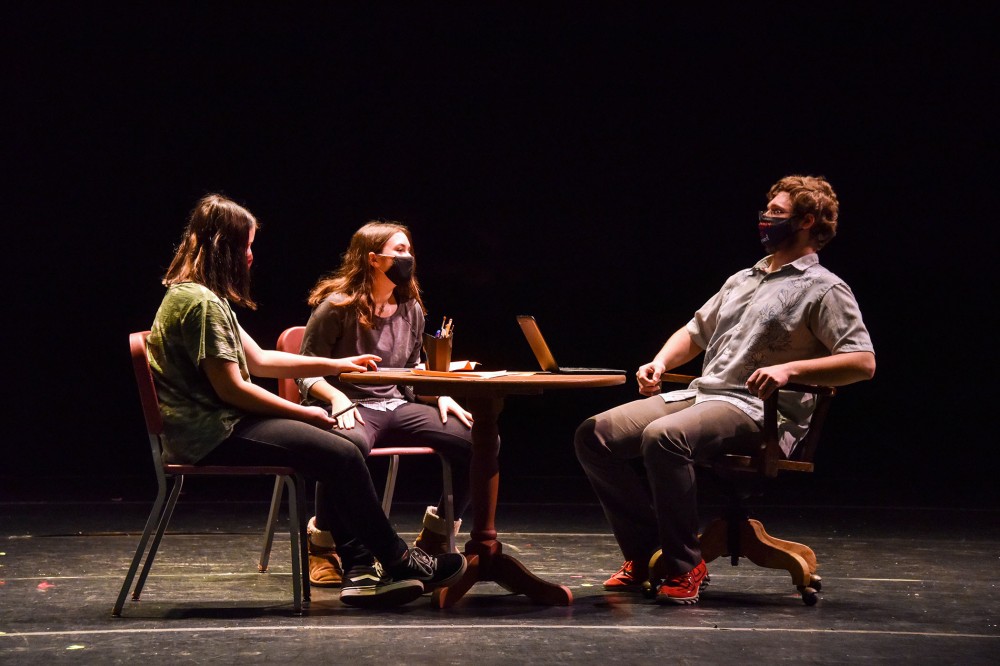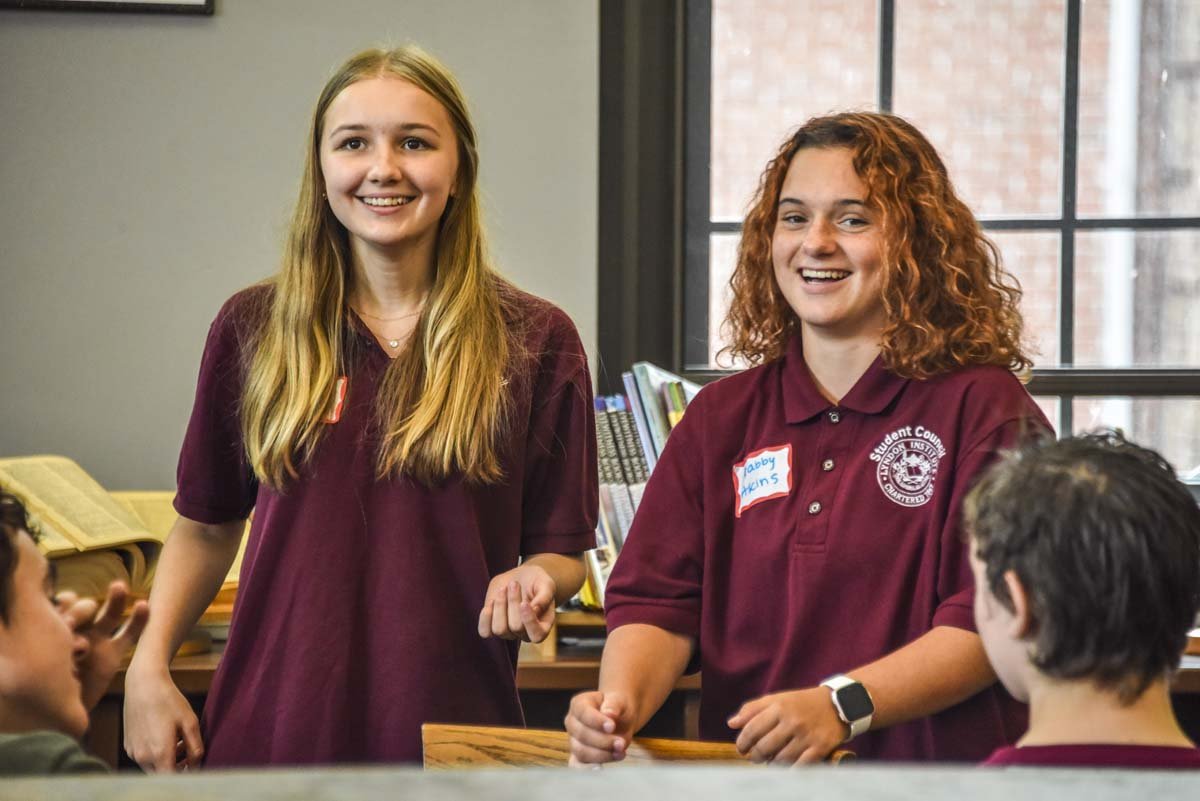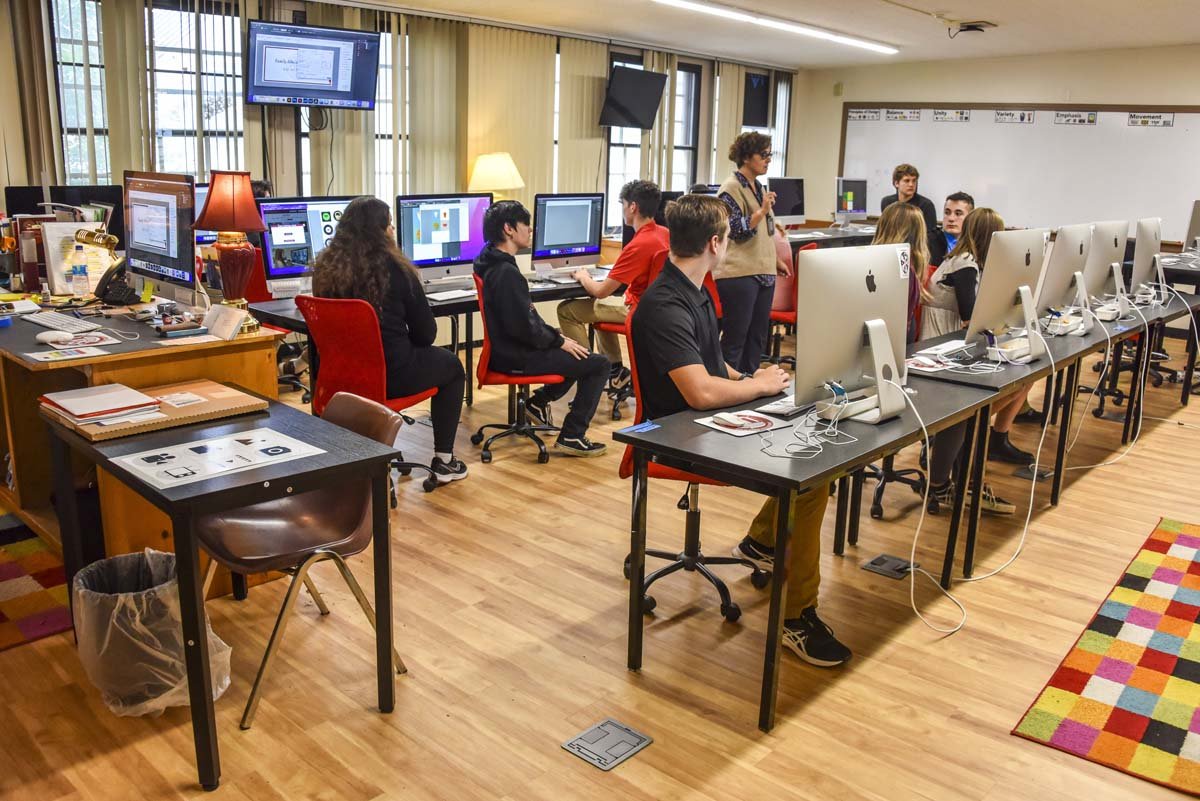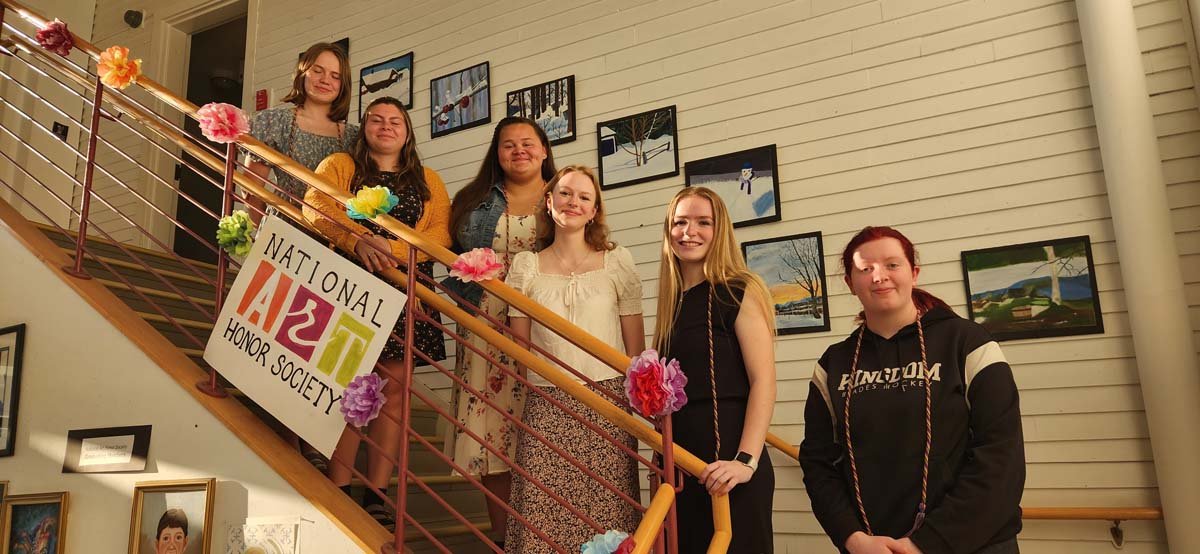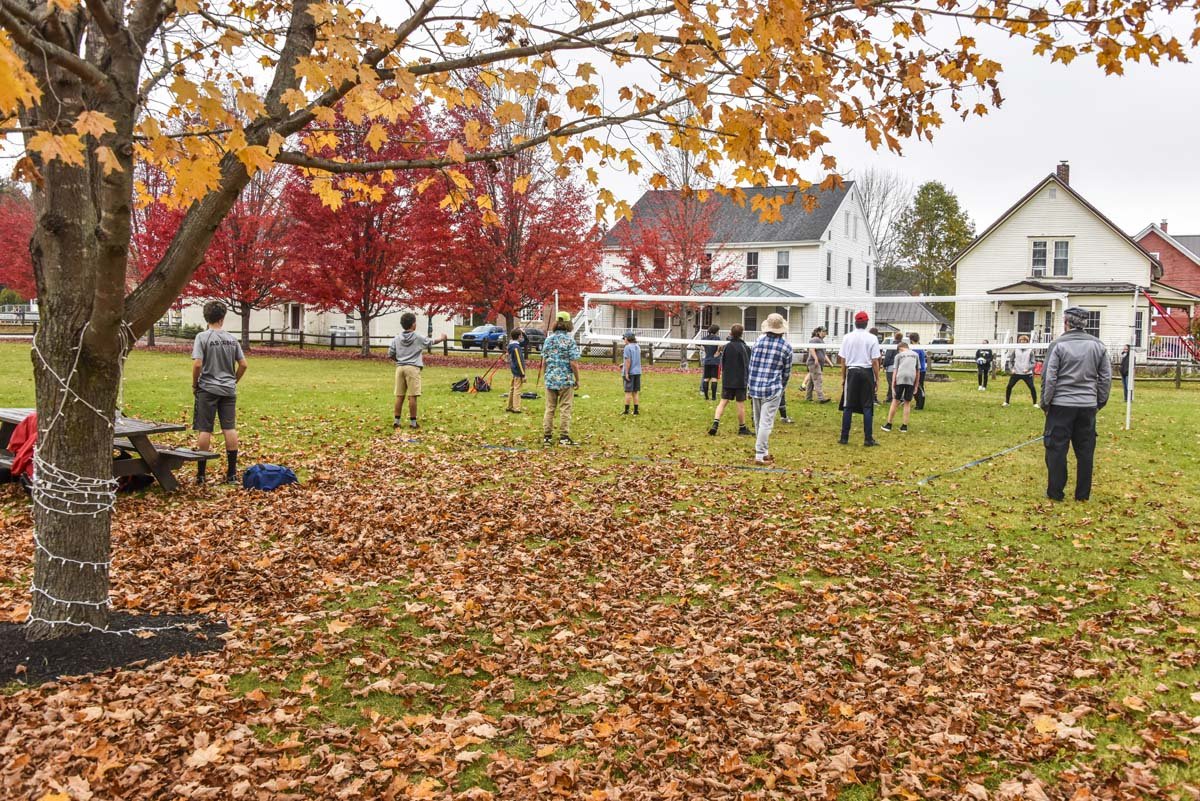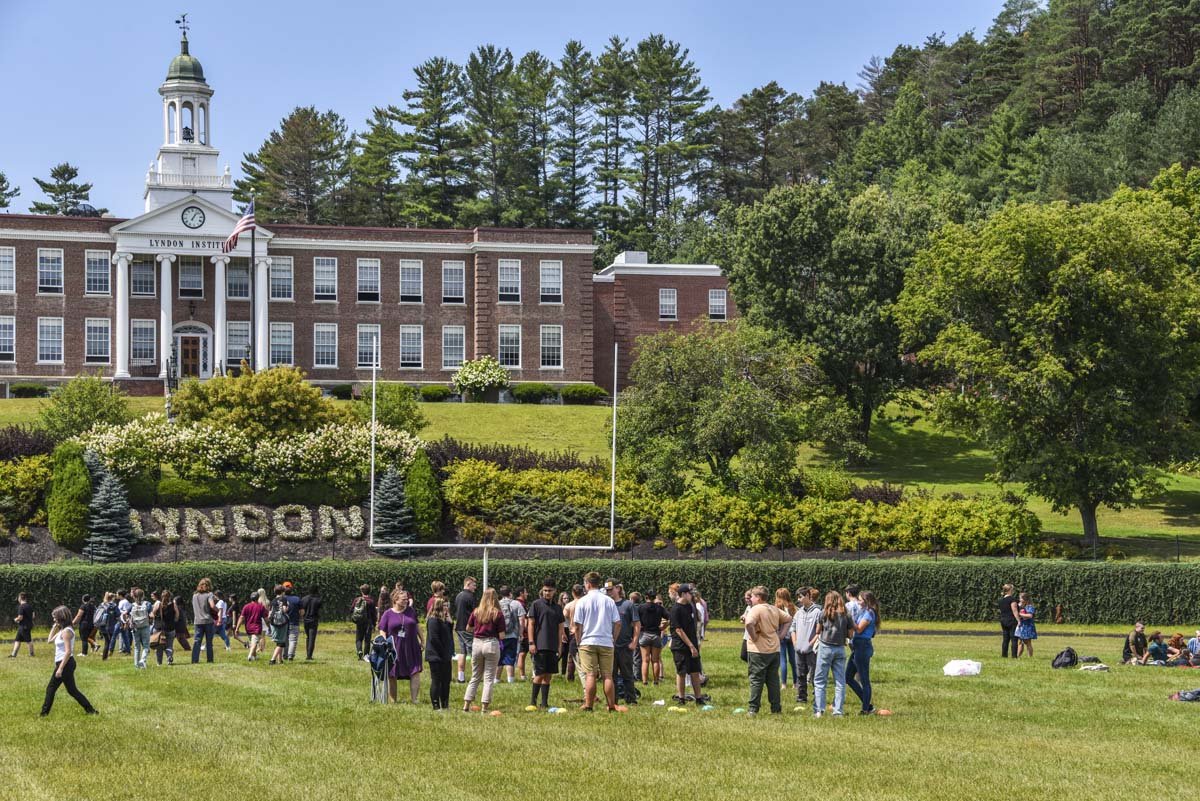- Our School
- Admissions
-
Academics
- Divisions and Faculty
- Commencement 2024
- January Term
- International Program (ESOL)
- College and Career Counseling
- Upward Bound
- Library/Monahan Academic Commons
- Career/Technical Education
- Lyndon Learning Collaborative
- Flexible Lyndon Institute Pathways (FLIP)
- Specialized Instruction
- Adult Continuing Education
- Lyndon Institute Course Catalog
- Student Services
- Arts
- Athletics
- Campus Life
- Support LI
- Alumni
« Back
Class Acts: Theater Now
December 17th, 2020
By David Stahler Jr.
In our last Class Acts, we looked at how the COVID-19 pandemic has impacted LI’s Dance and Music programs. This week, we examine our school’s other performing art--Drama.
One of my favorite places on the Lyndon Institute campus is Alumni Auditorium. Aside from the colorful flags now lining the walls representing the forty-six different native countries of students who have lived and studied at LI since our boarding program reopened, the space looks pretty much the same as when I was a student here over thirty years ago. When empty, the auditorium is a place of great peace; when filled, it is a place of communion, creation, and vitality, a place of energetic assemblies, raucous pep rallies, and—best of all—inspiring performances.
This fall, the auditorium has taken on a strange, almost foreign feel on the rare occasions I have reason to enter, with the quiet feeling more sad than peaceful. When you’re in there, it’s hard not to think of all the things that aren't happening this year, the traditions that have been put on hold for the greater good.
But not today. On this early December afternoon, I enter to see students once again working, laughing, occupying the stage. It’s a small group—maybe ten students or so—but it’s something. In fact, it’s more than something. It’s Theater Now, a new class created and taught by LI’s new drama instructor, Crenshaw Lindholm.
From its earliest days Lyndon Institute has offered theatrical productions. But they were typically directed by teachers as an extracurricular activity until about eighteen years ago when Headmaster Rick Hilton created a dedicated drama instructor position to not only take over the productions but begin offering theater and tech classes. Since then, LI has been lucky to have an unbroken chain of talented teacher-directors.
What makes Lindholm unique is that he’s a product of that rich tradition, the first to have been both a student in the program and now its teacher. He also has the unfortunate distinction of arriving at a time when the performing arts have been hit hard by a pandemic and the accompanying state restrictions. The fall musical, perhaps the highlight of the LI theater department’s offerings, was cancelled last spring due to concerns about COVID-19. Drama class offerings have been reduced over the last several years, as well, in part due to budgetary constraints.
The combination has forced Lindholm to start from scratch and rebuild the program from the ground up, beginning with a new class called Theater Now, which is serving this fall as a kind of introduction to drama in which students work on developing scenes and monologues, learning the terminology and techniques of stagecraft along the way.
Fortunately, there’s no shortage of interest from students. Lindholm’s class, broken into two cohorts this fall with LI’s hybrid schedule, enrolls nearly twenty students. Many are underclassmen and novices new to the stage—the next generation of actors and actresses—but more than a few are upperclassmen and experienced performers who have already starred in productions over the last two or three years and who, in a year of disappointment, are hungry for at least some taste of the stage after months of distance.
I asked Lindholm how this mix of experience and talent plays out in what is designed to be an introductory-level course.
“Surprisingly well,” he said. “The new students definitely benefit from having more seasoned actors in class who make wonderful role-models and, in some ways, function almost as assistant instructors.”
I asked one of the veteran actors, Kit Slicer, what it meant for him to be enrolled in this course after having taken acting classes and starred in numerous productions over the previous three years.
“A lot,” he said. “It’s really my only sense of normal life right now. Just having this class fuels my creative outlet.”
And what is it like working with new students?
“I’ve really enjoyed being in a class with different levels of experience. We learn from each other everyday.”
But for Kit, it’s even more than that. It’s also about giving back. “I was one of these freshmen once,” he acknowledged. “Seeing them makes me realize how much I’ve learned. What’s most important to me is that theater stays and thrives after I’m gone.” For him, participating in this class is a way to help ensure that.
I asked him how he got into drama in the first place.
“My older brother performed in plays when he was a student at North Country Union High School. One of the highlights when I was a kid was going to see his productions.”
For students like Kit, however, being part of the drama program is about more than just artistic expression.
“At first I just wanted to be a techie. I didn’t really know anyone when I came to LI, so I mostly joined to make friends, then discovered I loved acting. Overall, it’s helped me become a more confident, outgoing person.”
On this day, students are working in pairs and trios, presenting scenes for review. This is their second round of performance, and they spend the first part of class reviewing “notes”—constructive feedback—from their initial attempts the week before. Crenshaw moves from group to group, listening in and offering his own critiques (“Take it further,” “Don’t be as timid,” “Express through your actions more than your words”).
Then it’s time to go. The lights come up and one by one the groups take the stage and act out their scenes. Despite the minimal sets (a table and chairs, a few small props) and lack of costumes, for a few moments the magic of theater reigns and their words linger in the auditorium’s quiet, punctuated by applause.
An in-depth discussion of what transpired follows each scene. In some ways, this is where the students and instructor truly shine. As the students offer their reactions, Lindholm encourages the students to be ever more specific in their feedback, using their commentary to ask questions that push the analysis ever deeper.
Many of the comments focus on the actors’ body language. One student notices a performer’s legs were crossed in a scene. “What does that show?” Lindholm asks. Another points out that the characters in another scene always end up sitting in their chairs. “What does sitting in a chair suggest?” Each question triggers an engaging dialogue around their characters’ motivations and behaviors.
Lindholm also pushes them to not shy away from being critical, something that doesn’t come easy, especially for beginning actors. “Acting is about reacting,” he tells them. So is—as these students are learning—being a constructive peer.
I asked Lindholm, who studied the dramatic arts at NVU, what brought him back to teach at his alma mater. “As an actor, I had a passion for theater, but I didn’t have as strong a sense of purpose. Working with the Vermont Children’s Theater as a director made me realize how much I loved working on that side of the production. Directing has allowed me to combine both passion and purpose.”
So what’s in store for LI’s drama program as it rebuilds and a new wave of vaccines offer the return to normal life?
First up is Advanced Acting, a course that will debut next semester. Through it, Lindholm plans to not only push his students to further develop their acting skills but also introduce them to the business side of the acting world—developing a resume, taking headshots, recording acting clips, and understanding how agents and contracts work. Lindholm also hopes to draw upon his own construction skills and reintroduce a tech course (“Theater techs can make serious money,” he says) and hopefully another acting class or two.
Beyond the classroom, another immediate goal is to bring back the traditional productions that have helped define LI’s program—the fall musical and the Vermont Drama Council’s One Act Festival. Though the state festival isn’t an option this coming spring, Lindholm plans on reintroducing an extracurricular club next semester for those who can’t fit Advanced Acting into their schedules. Together, the club and class will produce a joint venture featuring a series of Shakespeare vignettes.
But Lindholm has an even bigger vision, inspired by his experiences both as a youth actor and adult director with Vermont Children's Theater’s summer program in Lyndon. “I would love for our program to have even more of a community presence. I want our students to think of theater as not only something they do for themselves but also for their community. Maybe that involves fundraising activities or working with other organizations like Catamount Arts.”
For now, Lindholm and his students are enjoying their time together, laying a new foundation for a return to the stage and an auditorium once more filled with the sound of song, laughter, and applause. For them—for all of us—it can’t come too soon.
Caption: Lyndon Institute theater students (L to R) Taylor Trepanier, Lauren Labounty, and Cameron Barney perform a scene on Monday, December 14th on LI’s Alumni Auditorium stage. Students on this day took turns presenting short scenes to the rest of their class for constructive feedback. Photo by Javin Leonard – Lyndon Institute
Posted in the categories Front Page, Theater.

